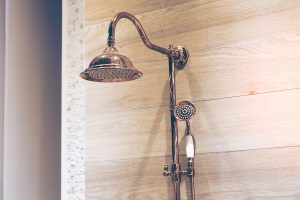Who doesn’t like a shower with a nice, steady flow? However, if the water keeps dripping out of the showerhead long after you’ve turned off the shower, then you have a problem on your hands. In addition to hearing the annoying dripping sound coming from your bathroom, a leaky showerhead can also waste water and cost you money on your water bill.
If you have a leaky showerhead in your home, here are five common reasons why it’s happening. Once you identify the cause, you can decide whether it makes more sense to repair or replace the showerhead.
1. Clogged showerhead holes
Over time, the holes in the showerhead can become blocked my minerals deposits (especially if you have hard water). If the water can’t make it through the holes, it has to go somewhere – and it usually ends up leaking from the faceplate or the base of the pipe.
The solution: This is a fairly easy situation to fix. Fill a plastic bag with vinegar, place it around the showerhead (so the head is submerged in the vinegar), attach the bag so it can sit for about 12 hours. The vinegar should break down the mineral deposits. Finally, use a small brush to remove any remaining deposits. Turn on the shower and check to make sure water is freely flowing from all the showerhead holes.
2. Worn-out rubber seals
Inside the showerhead are rubber O-rings and washers that are designed to make watertight connections. It’s common for these rubber parts to break down or crack, which allows water to leak through where it’s not supposed to.
The solution: You can remove and take apart the showerhead to find the rubber seals that look worn out and need to be replaced. Take old parts into the home improvement or plumbing supply store so you can get the correct size for the replacement.
3. Defective handles
Even though the leaky water is coming from the showerhead, the source of the problem may be found within the shower handles. Specifically, if you have compression faucets with separate cold and hot handles, the washer seals behind the handles can wear out and allow water to travel up and out of the showerhead – even when you think you have it turned off.
The solution: Turn the hot and cold faucet on and off one at a time to determine which side is causing the leak. Then remove the handle to get to the washer seal to replace it.
4. Malfunctioning diverter valve
When you change the flow of water from the bathtub faucet to the showerhead, you’re activating the diverter valve. Just like the other parts, this valve can wear down or become clogged with mineral deposits over time. Depending on that state of the diverter valve, it can be cleaned or replaced.
The solution: This fix is a little more complicated. First, you need to shut off the water supply. Then you’ll have to remove the faucet handle to reach the diverter valve. It can be difficult to unscrew it if there’s mineral buildup. But once you remove it, you can clean it with a small wire brush and vinegar. If the valve appears damaged, then it’s time to replace it.
5. Faulty cartridge valve
The cartridge valve adjusts the flow and temperature of the water of a faucet. If it’s old and worn out, it may be letting unwanted water go up to the showerhead. That means it needs to be replaced.
The solution: Similar to the diverter valve, getting to the cartridge is more complicated than some of the other solutions we’ve covered. You’ll need to remove the faceplate of the shower faucet to access the cartridge. We recommend calling in a professional plumber for this job.
A leaky showerhead is a common plumbing problem, and one that you may be able to fix yourself. Of course, if you run into any problems or prefer to know that the job is done correctly by a professional, you can always call the expert team at Rick’s Plumbing. We have an experienced team that serves New Haven and Fairfield, CT. Call us today at (203) 874-6629.



